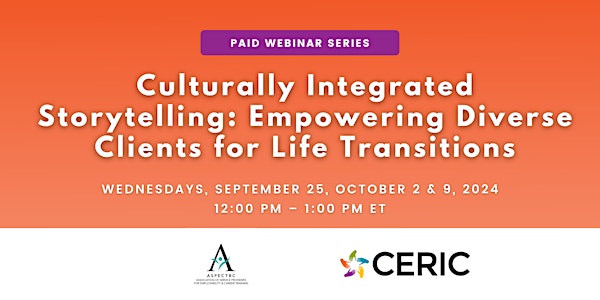
Culturally Integrated Storytelling: Empowering Diverse Clients
The series aims to empower practitioners by providing a comprehensive understanding of storytelling's profound role.
Date and time
Location
Online
Refund Policy
About this event
- 14 days 1 hour
Overview of the Webinar Series:
Storytelling is perhaps the most time-honoured form of communication. More often than not, our first professional encounter starts with an invitation: “So, tell me about yourself”. Yet many of us are not equipped to tell our story to someone unfamiliar with our culture. Indeed, the art of storytelling draws on self-awareness, cultural sensitivity and effective message delivery. So, how do we support a client and alleviate the stress resulting from cultural misunderstandings? How do we eliminate the risk of a client being “dismissed” before they even get assessed for the job? How can career practitioners, especially those working with diverse populations, equip their clients with the knowledge of storytelling and support them in navigating not only the process of their job search, but also their life transition?
The series aims to empower practitioners by providing a comprehensive understanding of storytelling's profound role, with a specific focus on pivotal aspects during significant transitions. It will prepare career practitioners with practical skills to guide clients through storytelling nuances, fostering self-confidence and preserving cultural distinctiveness.
Why Career Practitioners Should Attend:
We’ll start the series by reviewing the differences between cultural assimilation and cultural integration. We’ll explore the essentials skills that career development practitioners need to build when helping clients to integrate their story with their culture and how they can empower clients to cultivate cultural competency by encouraging authentic storytelling. Our presenter will use intercultural learning models and point participants towards tools and resources to support their clients in finding common communication grounds when conversing with people from different cultures.
At the end of the series, practitioners will be able to better coach their clients in telling their own stories and will have the tools to effectively support them in implementing practical steps that allow for a smooth cultural transition. Our end goal is to empower clients to preserve and appreciate their cultural uniqueness while learning how to nurture their own understanding and appreciation for cultural differences.
Key Learning Takeaways:
Webinar #1: Intercultural Communication in a Business Setting
Career practitioners will gain an understanding of the mechanisms that underpin cultural integration, which in turn will help them illustrate the steps clients would need to take so they can move forward. CDPs will look at these steps through the lens of those who are just entering a new workplace culture.
- Learn about intercultural relations: describe, interpret, evaluate
- Take practical steps towards improving your understanding of other cultures
- Revisit common cultural assumptions
- Reevaluate the way you perceive yourself culturally
- Observe your cultural identity in your own intercultural communication
Webinar #2:The Importance of Storytelling
The importance of storytelling in one’s life will be the highlight of this second webinar of the series. With a focus on the span of a major life transition, such as moving to a new country, we will be using Nancy Schlosberg’s transitions theory to look at factors describing the Self. To showcase the importance of storytelling, we will watch video interviews and review the implications that “dismissed” or “muted” stories can have on one’s professional development, growth and mental health.
- Revisit the history of storytelling and what determines how we communicate
- Learn why our cultural identity is a powerful analytical tool
- Travel through life transitions, hear about “cultural aliens” and understand the social process of “othering”
- Locate situations, revisit the self, available supports, and learn to build new strategies
- Review implications of intercultural miscommunication
Webinar #3: Storytelling, Job Interviews and Networking Events
Learn how to find common communication grounds and encourage diverse clients to use authentic storytelling in all their professional encounters.
- Support clients to communicate their sense of self and apply their awareness
- Clarify with your client how to integrate their story with their culture and their listener’s culture
- Use the transaction model of communication in various ways
- Inspire the storyteller to align their story to their industry standards
- Motivate storytellers to address cultural assumptions
- Evaluate tools for analysis and self-reflection: revisit experiences, cultural assumptions, self-perceptions and fixed mindsets
Presenter:
Magdalena Mot is currently the Senior Manager for Work-Integrated Learning at Capilano University. With an academic background in cultural anthropology and several years of work experience in project management, Dr. Mot’s current research interests are focused on the ties between one's cultural heritage and the ways this inheritance affects one’s career development decisions, especially when in a major transition. Dr. Mot’s work connects experiences scattered over 25 years of living, working and studying in four different countries and speaks directly to her core values of diversity, authenticity and her drive to build inclusive communities.
Dr. Mot is an experienced educator and she has over 12 years of teaching experience. Her specializations include career development and intercultural communication in a global business ecosystem. Currently a Certified Master of Career Services (CMCS), Dr. Mot is also the Chair of NCDA's Global Connections Committee, and an active member of CERIC’s Practical and Academic Research Committee.
Tickets
Individual Non-ASPECT Member Rate - Full Series
0CA$159.00Individual ASPECT Member Rate - Full Series
0CA$119.00Group Non-ASPECT Member Rate - Full Series
0CA$119.25Group ASPECT Member Rate - Full Series
0CA$89.25